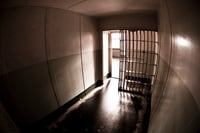Twice-weekly high-dose unilateral electroconvulsive therapy (ECT) appears to be no less effective...
MH Professionals in Correctional Systems Urged to Treat Sleep Issues, Advocate for Solutions

Disrupted and deprived sleep—known to increase the risk of psychiatric symptoms such as depression and anxiety and other health problems—is a common experience lived by inmates in U.S. jails and prisons. A paper in Psychiatric Services in Advance describes lawsuits by inmates that have attempted to address this problem and discusses clinicians’ responsibility to evaluate and treat inmates for sleep-related problems.
APA past President Renée L. Binder, M.D., Nathaniel Morris, M.D., and Jessica Holliday, M.D., M.P.H., of the University of California, San Francisco, outlined five conditions that have commonly led incarcerated individuals to file lawsuits alleging sleep deprivation:
Noise. A man who was placed in a federal prison cell with five other men for approximately 28 months filed a civil rights lawsuit over the constant noise as well as unsanitary environment, poor ventilation, extreme temperatures, and other conditions. In 2020, a jury awarded $20,000 to the plaintiff; as of October 2020, the case was pending appeal.
Inadequate Bedding. An incarcerated man in Connecticut filed a lawsuit alleging that his mattress had a large slit down its center and smelled of mildew. The plaintiff reported experiencing pain and sleep loss because of the mattress while at least one prison official allegedly disregarded requests for new bedding. In 2014, a jury awarded $12,000 in damages to the plaintiff.
Constant Illumination. A man filed a lawsuit against Oregon state prison officials claiming that “large [fluorescent] lights . . . shone into his cell 24 hours a day.” He alleged that the constant light prevented him from differentiating day from night, disrupted his sleep, and caused mental health problems.
Medication Restrictions. Incarcerated individuals may face considerable legal hurdles when suing for access to sleep-related medications. Several court decisions have cast doubt on whether insomnia alone constitutes a “serious medical need.”
Irregular Wake-Up Times. Incarcerated individuals filed a class action complaint over sleep deprivation, given a jail’s policy to keep lights on until at least 11 p.m., administer medications at 2:30 a.m., and turn lights back on at 4 a.m. for breakfast.
Despite jail and prison conditions that may be difficult to change, the authors emphasized that clinicians have a responsibility to evaluate and treat incarcerated patients with sleep-related concerns. Nonpharmacologic strategies, such as relaxation techniques or brief cognitive-behavioral therapy, may help mitigate the effects of prison and jail practices on sleep. Careful review of prescribing patterns of insomnia-related medication, analysis of patient outcomes, and use of evidence-based formulary restrictions are also key for supporting patients’ well-being.
“We wanted to alert psychiatrists to the fact that sleep deprivation is a pervasive problem in our nation’s jails and prisons that causes serious health and mental health consequences for individuals who are incarcerated,” Binder told Psychiatric News. “As psychiatrists, we can advocate for standards and policies that mitigate the kinds of conditions that result in sleep deprivation. Forensic psychiatrists and other mental health professionals who work in the correctional system can also adopt clinical practices that can help incarcerated individuals.”
For related information, see the Psychiatric Services article “Grave Disability in U.S. Jails and Prisons,” also by Binder and Morris.






